O RTHODOXY
 G. K. C HESTERTON
G. K. C HESTERTON 
O RTHODOXY
F OREWORD BY  M ATTHEW L EE A NDERSON
M ATTHEW L EE A NDERSON
M O O D Y C L A S S I C S
MOODY PUBLISHERS
CHICAGO
Originally published in 1908 by
Dodd, Mead & Co.
2009 edition by
T HE M OODY B IBLE I NSTITUTE
OF C HICAGO
All Scripture quotations are taken from the King James Version.
Interior Design: Smartt Guys design
Cover Design: Erik M. Peterson
Library of Congress Cataloging-in-Publication Data
Chesterton, G. K. (Gilbert Keith), 1874-1936.
Orthodoxy : the romance of faith / G.K. Chesterton.
p. cm.
ISBN 978-0-8024-5657-1
1. Apologetics. 2. ChristianityEssence, genius, nature. 3. Chesterton, G. K.
(Gilbert Keith), 1874-1936. I. Title.
BR121.3.C39 2009
239dc22
2009004827
We hope you enjoy this book from Moody Publishers. Our goal is to provide high-quality, thought-provoking books and products that connect truth to your real needs and challenges. For more information on other books and products written and produced from a biblical perspective, go to www.moodypublishers.com or write to:
Moody Publishers
820 N. LaSalle Boulevard
Chicago, IL 60610
1 3 5 7 9 10 8 6 4 2
Printed in the United States of America
To My Mother


by Matthew Lee Anderson

How can we contrive to be at once astonished at the world and yet at home in it? And with that question, G.K. Chesterton recounts the heart of an intellectual journey that took him from the edges of a nihilistic pessimism into the center of the paradoxical joy of Christian orthodoxy. His book is not a defense of the Christian faith, at least not primarily, so much as an attempt to explain how the startling paradoxes and sharp edges of the creed explain everything else. It is a dated work, dealing in the categories and concerns of Chestertons contemporaries, and yet it comes nearer timelessness than anything we have today. Though Orthodoxy was written near the start of the 20 th century, I have dubbed it the most important book for the 21 st . There are few claims I have made in my life that I am more sure of than that one.
Beneath Chestertons work is the desire that his opening question highlights: We long to find ourselves in the mixture of familiar and unfamiliar which Christendom has rightly named romance, to be brought into a world that is full of poetical curiosity. Or at least thats what people once wanted, at any rate. Our own ethos tends to be more prosaic, more pragmatically minded, and a good deal less patient than his. That sense of longing, the joyful suspense of living in a world of concealed, discoverable delightsnot many of us have the patience to feel that sort of longing anymore, or the courage to follow when it takes hold of us. We revel in the ambiguities and gray areas of life, yes, but without the cheerfulness of people who are looking forward to finding out whats beyond them.
The world Chesterton explores is not a dour one. He is lighthearted and humorous, but without (he insists!) being flippant. There is a tendency, which I must confess that I share, to look askance at the cheerful as though they must be blinkered and blind. Yet Chesterton was no stranger to painhe knew well the temptations of despair, because hed almost given in to them himself. But then, as he puts it himself, Solemnity flows out of men naturally; but laughter is a leap. It is easy to be heavy: hard to be light.
It is fitting, then, that Orthodoxy is a hard book for us to read. Chestertons prose can be as elusive and enchanting as the world he believed in. It stretches into poetry, as Chesterton attempts to dig out the obvious truths that our modern world has covered up (which is only one of the many paradoxes within). Chestertons arresting sentences sometimes have the peculiar effect of obscuring his point. It wasnt until my fourth reading that I realized each of the chapters worked together (which I may be forced to someday acknowledge says more about me than it does Chestertons prose). Until that point, Orthodoxy was an endless barrage of entertaining and provocative phrases that were only peripherally connected. There is a logic to the book, but it lies beneath the surface. Chesterton can plod through an argument, as he does in The Everlasting Man . But here his goal is different: he provides a set of mental pictures, he tells us, and they happen to be very picturesque. He is no sophist, as he is sometimes accused of being, but to follow his leaps may require patience and a sympathetic eye.
Of course, Chesterton notes up front that the book is autobiographical but only barely so. It is a slovenly autobiography, and that exclusively of the intellectual sort. Yet therein lies the point, for while Chesterton is charged with outlining what he thinks, he disavows that the ideas are his in any meaningful sense at all. He will not call it his philosophy, as he puts it, because God and humanity made it; and it made [him.]
That sort of bold confidence has become uncomfortable to many of us only because it seems so unusual. We are more inclined to hide behind the safe, protective confines of it seems and I think and every other qualifier that traps us in our heads. Humility is a virtue, of course, and one that has always been on short supply. But contrary to what we might think, Chestertons outlook breeds a certain sort of self-suspicion rather than undermines it. As he puts it, A man was meant to be doubtful about himself, but undoubting about the truth; this has been exactly reversed.
Such confident proclamations might seem quaint, as though they are simply relics of a simpler era before the world was faced by pluralism and naturalism and every other sort of objection we have been reminded about in recent years. Yet Chesterton was no stranger to those worries either: he takes on the one real objection to the faith in the sixth chapter, for instance, addressing the (ostensibly) narrow and localist scope of Gods revelation in a world full of other faiths and peoples. He takes on sexual permissiveness and materialism. But such arguments are the fruit of Chestertons confidence, not the grounds of it. For reasons, Chesterton turnedeverywhere. [A man], he writes, is only really convinced when he finds that everything proves it. And the more converging reasons he finds pointing to this conviction, the more bewildered he is if asked suddenly to sum them up.
Still, the world Chesterton describes is so alluring precisely because it is so colorful and bold. He was trained as an illustrator and adept at caricatures, and his mental pictures often exaggerate the key features so that we can see them clearly. Chesterton was not unfair to those he disagreed with, nor was he mean spirited. Few people could get away with writing a book named Heretics and remain friends with many of the people named, but Chesterton somehow managed to do it.
If anything, Chesterton drew sharp lines between Christianity and everything else because he discerned them, and because those lines are essential to love. Unlike many of us, Chesterton was never afraid of differencehe seems to have reveled in it because Christianity revels in it. Chesterton could drink disagreement like wine because he loved the truth like water (to flip his own phrase around). He held his convictions courageously because he knew they were not his at all, but he was theirs. As he puts it, It is the instinct of Christianity to be glad that God has broken the universe into little pieces, because they are living pieces. It is her instinct to say little children love one another rather than to tell one large person to love himself. And that love, he says elsewhere, is a cosmic oath of loyalty that frees us to criticize rather than prevents us from doing so. Love is not blind; that is the last thing that it is. Love is bound; and the more it is bound the less it is blind. (You see what I mean, I hope, about those glittering sentences.)
Next page
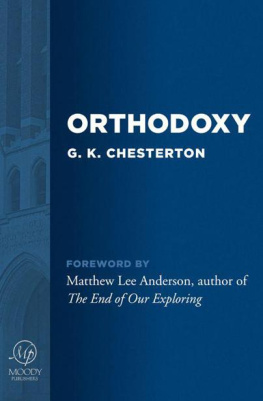
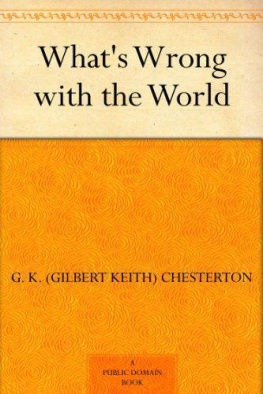
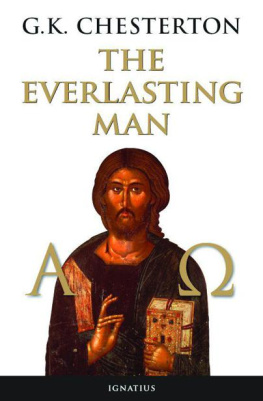

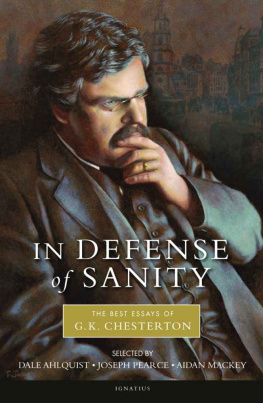
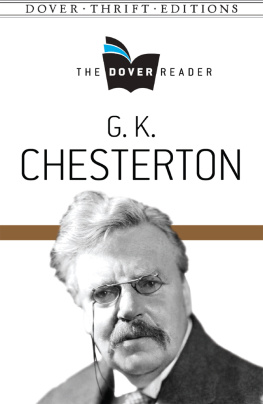
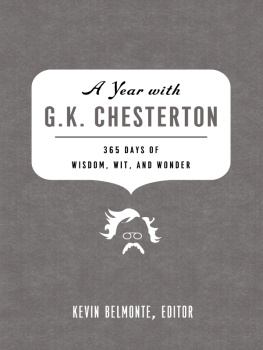
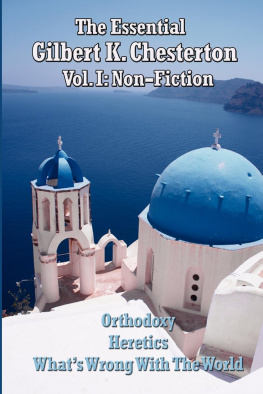
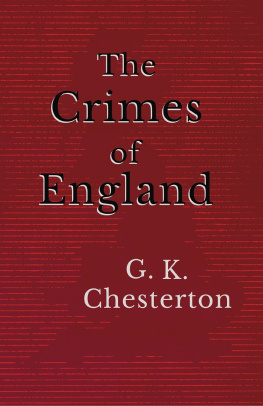

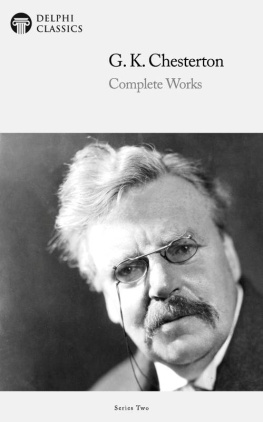
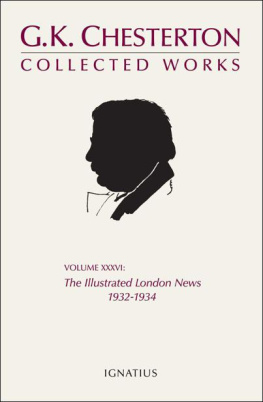
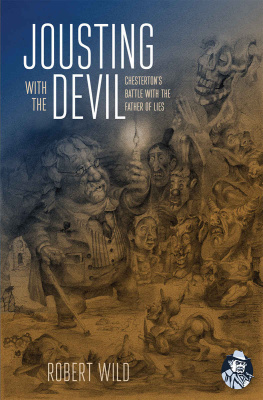
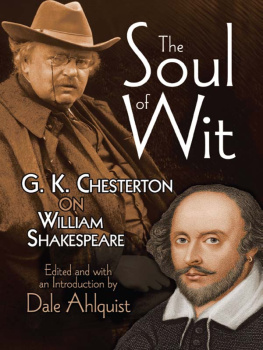
 G. K. C HESTERTON
G. K. C HESTERTON 
 M ATTHEW L EE A NDERSON
M ATTHEW L EE A NDERSON
